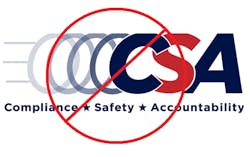FMCSA pulls the plug on new safety fitness ratings
The Federal Motor Carrier Safety Administration (FMCSA) has announced in the Federal Register that it is withdrawing its controversial safety fitness determination (SFD) rulemaking issued in January 2016 and will also cancel plans to issue a supplemental notice of proposed rulemaking (SNPRM) announced back in January to help support the SFD effort.
“The new methodology would have determined when a motor carrier is not fit to operate commercial motor vehicles (CMVs) in or affecting interstate commerce based on: the carrier’s on-road safety data; an investigation; or a combination of on-road safety data and investigation information,” the agency noted in its filing, which is on “public display” until being officially entered in the record tomorrow.
Yet FMCSA said “after reviewing the record in this matter” it decided to withdraw both the NPRM and SNPRM regarding the SFD rule, adding that “additional analysis” will need to be completed before determining whether further rulemaking efforts are necessary to revise the SFD process in the future.
The American Trucking Associations called the withdrawal “a positive step” for the agency to improving its Compliance, Safety, Accountability system.
“ATA has long supported using data to target enforcement activities against bad actors in our industry,” said ATA President and CEO Chris Spear. “However, numerous reviews have shown flaws in the data and in the CSA system, so it makes sense to withdraw this rule which would have used CSA data to create publicly available fitness ratings.”
ATA pressed for CSA reforms in the most recent highway bill – Fixing America’s Surface Transportation Act – which called for a full study by the National Academies of Science and for FMCSA to make changes based on that study.
Back in February, over 30 national transportation groups and 30-plus state and regional associations sent a joint letter to Transportation Secretary Elaine Chao calling for the FMCSA’s SFD rulemaking to be dumped as it was based on what they characterized as “flawed” data taken from the agency’s Compliance Safety and Accountability (CSA) program and Safety Measurement System (SMS).
“We do not believe it makes sense to build a new safety fitness determination system upon a flawed system [that] is currently undergoing congressionally-mandated review and reform and is likely to change,” the groups said in their letter.
“While we support the goal of an easily understandable [and] rational safety fitness determination system, this proposal is built on a flawed foundation,” they stated.
ATA found the use of a singular “unfit” rating within the proposed revamp of SFD methodology particularly troubling.
“This flaw in the system is troubling. The term ‘unfit’ is applied to fleets that, comparatively speaking, are considered the least safe in the industry,” ATA wrote. “Yet FMCSA lacks sufficient data on 4/5ths of the industry to make such a determination.”
Similarly, the Truckload Carriers Association (TCA) emphasized the importance of safety determinations, and that “it is imperative that the judgment of rendering a carrier as ‘unfit’ be based upon the most accurate information available to the agency.”
However, “the very fact that this rule would only determine the safety fitness of approximately 75,000 carriers is incomprehensible and discriminant to say the very least,” the group said.
As a result of this shortfall, TCA noted it could not support a rule that creates an environment that is not equal to all involved and in many cases, allowing a competitive advantage of one carrier versus another.
